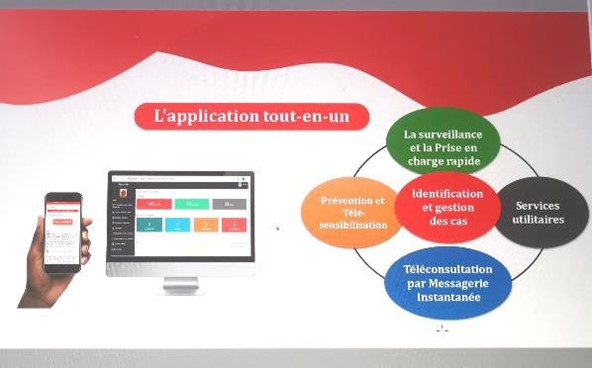Disclaimer:
Please be aware that the content herein has not been peer reviewed. It consists of personal reflections, insights, and learnings of the contributor(s). It may not be exhaustive, nor does it aim to be authoritative knowledge.
Description de DiagnoseMe DiagnoseMe est une application web et mobile innovante qui permet l’identification, le traçage et la mise en relation avec le personnel médical d’une personne malade pour contribuer à la limitation de propagation de la maladie et une prise en charge rapide. C’est une application qu’on peut installer sur smartphone et tablette. La plateforme permet également de faire la compilation automatique des données pour le suivi en temps réel des indicateurs.
Caractère innovant de DiagnoseMe C’est un outil de gestion de la pandémie et peut aussi être remodelé ou programmé pour d’autres pandémies ou épidémies. Il permet l’identification des cas et la gestion des alertes, par l’implication de bout en bout tous les acteurs de la chaine de prise en charge avec une traçabilité rigoureuse, un suivi télé médical instantané et une fluidité dans la surveillance épidémiologique. DiagnoseMe garantit un déconfinement dans des conditions saines et sécurisées, étant donné qu’il offre la possibilité de faire un autodiagnostic de son état à chaque instant et d’avoir des signes d’alerte en cas de doute ou de véracité de la maladie. DiagnoseMe fonctionne en offline (sans connexion internet) et online (avec connexion internet) de l’interface utilisateur. L’identification des situations d’urgence pour une prise en charge priorisée à travers la recherche et la prise en compte des signes de gravités et des comorbidités. La recherche active et le suivi des cas contacts ainsi que des perdus de vus à travers une invite automatique aux cas probables et confirmés à remplir la liste et les adresses de leurs cas contacts dans une interface directement transmise à l’équipe de gestion des cas contacts, ainsi qu’une invite de renseigner quotidiennement leurs symptômes sur la plateforme afin de faire leur suivi. La téléconsultation par messagerie instantanée avec les professionnels de santé de la cellule de veille. Le suivi des patients hospitalisés et non hospitalisés grâce à un système de dossier médical électronique continuellement actualisé L’interconnexion avec les autres bases de données à travers une interface de saisie manuelle et un système d’importation et de sommation automatique des données numériques. Ce système d’importation automatique permet la connexion avec les bases de données numériques du ministère de la santé. En outre les données téléphoniques du centre d’appel téléphonique d’urgence (dont le 3535 au Burkina Faso) ainsi que les données papiers des formations sanitaires sont aussi interconnectées avec celles de la plateforme. La Compilation automatique des données permet le suivi en temps réel des indicateurs épidémiologiques bruts, éclatées et mis en graphiques. La Sensibilisation sur les moyens de prévention et surtout la protection des personnes fragiles présentant des comorbidités ; L’information sur l’actualité concernant la COVID-19 et les démentis sur les fake news ou les informations erronées Les liens vers les technologies existantes permettant de s’adapter aux mesures de distanciation sociales à travers des liens vers des services de E-commerce, E-learning, Web TV, Web radio, pharmacies de garde…) ; Une Web TV et une Web radio pour renseigner les utilisateurs sur la pandémie et sur les questions de santé ; L’inclusion sociale à travers un guide vocal dans plusieurs langues nationales permettant l’utilisation de la plateforme par les personnes malvoyantes, les personnes ne s’exprimant qu’en langues nationales ; Cette inclusion prend en compte aussi les enfants à travers un guide de prévention infantile et un jeu concours spécial enfants pour la protection de l’enfance chère à l’Unicef et à des ONG nationales et internationales de la protection de l’enfance.
Promoteur : [REDACTED]
Problème adressé: Le coronavirus, détectée en décembre 2019 est une maladie qui est vite déclarée par l’Organisation Mondiale de la Santé comme une pandémie mondiale au regard par sa propagation et de ses effets sur la santé des populations. La pandémie exige des stratégies et des méthodes pour la contenir, sinon elle s’apparente à un cataclysme mondial. Ainsi, en début mars 2020 l’épidémie touche le Burkina principalement dans sa capital Ouagadougou. Un Hackathon est organisé pour detecter les solutions technologiques et innovantes destinées à permettre au pays de mieux faire face à l’épidémie est lancé. C’est ainsi que l’ application mobile intitulée « DiagnoseMe », est propose pour le test et la gestion des cas de COVID 19.
Impact: L’impact de DiagnoseMe est de contribuer à assurer une bonne santé aux populations du Burkina Faso


 3Good health and well-being
3Good health and well-being 5Gender equality
5Gender equality
Comments
Log in to add a comment or reply.